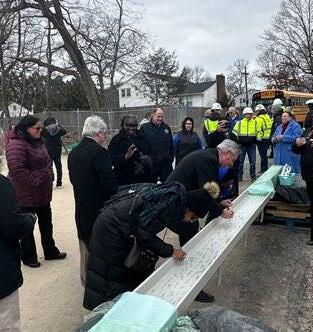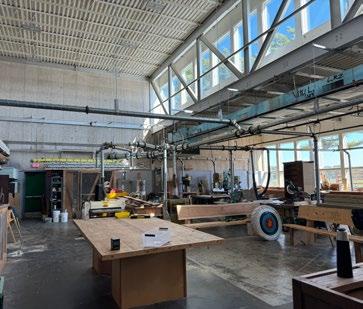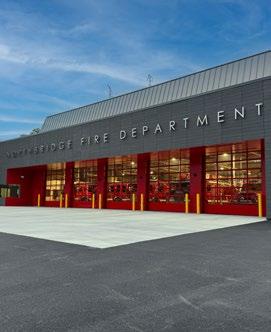
IN THIS ISSUE
» Industry Insight: Technology, Sustainability, and Facilities Management
» What’s New?
» Owner's Corner
» Project Highlights
» New Beginnings




» Industry Insight: Technology, Sustainability, and Facilities Management
» What’s New?
» Owner's Corner
» Project Highlights
» New Beginnings


The field of facilities management is facing new challenges but also remains centered around its ongoing mission to maintain built assets for the publics who use them. Technology has been introduced at a rapid pace, providing new ways to monitor and improve systems and operations. Initiatives are also driving sustainability in the form of improvements and modifications that address and reduce energy usage and the overall carbon footprint of built assets. At the same time, facility managers are tasked with a complex scope of ongoing building repairs, deferred maintenance, retrofitting historic structures to align existing spaces for new uses, accommodating modern technology, and designing and constructing new buildings that meet the needs of more diverse stakeholders. These facilities must also be energy efficient and leave less carbon impact on the environment.
The new technology emerging in this arena is exciting and promises to give us the type of information we need to manage built assets more efficiently and more effectively. Some of the most anticipated technology advances include the following:
• Predictive Maintenance – This technology, widely considered a game-changer in facility management, relies on data analytics, Internet of Things (IoT) sensors, and machine learning to predict or forecast when equipment will break down. This gives operators advance notice for maintenance before a critical failure. The advantages of this technology are many, including reduced breakdowns and downtime, cost savings because maintenance can be scheduled, more efficient allocation of maintenance resources, and fewer surprises or critical failures.
• AI, Machine Learning and the Internet of Things (IoT) –These technologies are revolutionizing facilities management by providing information that improves operational efficiency and supports predictive maintenance. In addition to predicting when maintenance is needed, these tools can help provide data to improve energy management and efficiency, enhance security systems, provide operational insights, and manage and optimize systems for user comfort and cost savings.
• Paperless Building Operations – This technology utilizes digital solutions rather than paper to manage facility systems and operations, increasing efficiency and reducing waste.
• Advanced HVAC and Energy Systems – There have been enormous strides and innovations in heating, cooling and ventilation that can be implemented to reduce cost, improve the reliability of building systems, and improve the sustainability of operations.
The emphasis on sustainability is also causing significant changes to the facilities management landscape. From HVAC systems to lighting, waste, and water conservation, these issues are at the top of building owners’ and stakeholders’ minds. As building systems are upgraded or replaced, there is a distinct movement toward systems prioritizing energy efficiency and meeting sustainability goals. In addition to building systems, there’s often a focus on incorporating sustainable materials and encouraging sustainable practices that reduce energy and water usage and reduce waste production.
The evolution of facilities management, including new technology and sustainability opportunities, will continue to inform the work we do each and every day. We remain committed to monitoring emerging trends, embracing innovative technologies, helping our clients understand and implement these technologies, and collaborating with our partners to improve the built environment.
Joseph Sullivan, MCPPO, is a Section Leader in the Project Management/Construction Management (PMCM) Group at CHA. Joe has more than 30 years of experience in facilities management and project management, including an indepth knowledge of public construction laws and regulations. He is a Massachusetts Certified Public Purchasing Official (MCPPO) and a candidate for a Massachusetts Building Inspector certification. He holds a construction supervisor's license and is trained in OSHA and confined space.

CHA has named Sean Sweeney Business Line Director for Project and Construction Management. Sean is based in CHA’s Boston office. With more than 30 years of professional project management and construction management experience, Sean specializes in working with clients engaged in capital programs, complex program management, and management of deferred maintenance.
“Sean’s expertise in representing owners and managing multifaceted capital projects is a perfect match for our solutions-oriented approach to providing best-in-class program and owner’s project management services for all types of owners,” said John Achenbach, CHA’s Sector President for Commercial and Institutional.
Sean joined CHA in 2021 and led the development of renu360, a facilities condition assessment software platform offered by CHA that will provide significant value to owners when it comes to managing deferred maintenance. He holds a Bachelor of Science in Civil Engineering from the University of Massachusetts, a Master of Business Administration from Babson College, and a Juris Doctorate from Suffolk University Law School. He also holds LEED AP BD+C & O+M and OSHA certifications and is a Massachusetts Certified Public Purchasing Official (MCPPO) and Certified Construction Manager (CCM).
After years of development, CHA was thrilled to launch renu360 in early 2024. The renu360 platform allows building owners, finance officers, facility managers, and municipalities to fully understand the condition of their built assets, as well as the level of investment needed to maintain these facilities. This tool allows your facility and planning team unparalleled insight into your built assets so they can provide proper stewardship of your facilities.
We understand that capital assets are your key to delivering on your mission. Managing and understanding the implications of deferred maintenance are critical to your ongoing operations, and postponed maintenance must be systematically addressed.
The renu360 platform starts with a CHA team of expert assessors collecting data via tablets on each facility. Once the data is collected and accumulated in renu360, that information can be used to prioritize the most critical issues, bundle projects into the most cost-effective and efficient delivery method, and provide scenario planning to determine future needs.
Are you interested in better understanding your built assets? Contact us to learn how renu360 can help your team take charge of deferred maintenance.








CHA announced that it has acquired D’Huy Engineering, Inc. (DEI), an engineering and project management firm serving educational, municipal, commercial, and industrial clients. With 100 employees, DEI is based in Bethlehem, Pennsylvania, and has several office locations, including Scranton, PA, and Wilmington, DE. The firm’s core services include project and construction management; structural design and forensic engineering; facilities engineering; water and wastewater infrastructure design; and mechanical, electrical, and plumbing engineering. The addition of DEI brings CHA’s staff count to over 1,800 in 55 offices from Canada to Florida to the Midwest.
“D’Huy Engineering is a great addition to CHA, bringing exceptional talent and longtenured clients that will help continue to drive our combined strategic growth in markets where our collective services are in high demand, including program/construction management,” said Jim Stephenson, CEO of CHA Holdings, Inc.

Amanda Sawyer was recently named Project Team Leader for the Boston office's Owner’s Project Management (OPM) group. Amanda joined CHA’s OPM team in 2019. She is a Massachusetts licensed architect, LEED Green Associate, and MCPPO certified.
We also congratulate Aditya Modi, MCPPO on his promotion to Project Manager. Adi joined the CHA OPM team in 2021 with a degree in civil engineering and a masters in construction management and is MCPPO certified.
CHA welcomes Project Manager David Hurley. Dave joined the team in 2023 with a degree in construction management and a wealth of experience with renovation, adaptive reuse, and mixed-use projects.
In January 2024, CHA announced that it had been acquired by H.I.G. Capital (H.I.G.), a leading global alternative investment firm with $60 billion of capital under management. “H.I.G. brings tremendous financial and operational resources with a great track record supporting companies and delivering value. We are confident this partnership will further position CHA for substantial growth and will provide opportunities to better support our clients and the markets we serve,” said CHA Holdings CEO Jim Stephenson.

Be sure to catch up with our team at the SCUP 2024 Annual Conference in Philadelphia, July 21-23. Our Boston Team will be joined by some of our newest PMCM colleagues from D’Huy Engineering, based in Bethlehem, PA. You’ll also find us exhibiting and demonstrating renu360 at ERAPPA 2024 in Valley Forge, PA, September 29-October 2. We hope to see you there!

Regardless of size and population, every municipality must manage facilities and provide stewardship for their built assets.
There is, however, a difference in the scope of responsibilities, scale, challenges, and available resources from entity to entity. Our two featured owners provide insight from different perspectives – a dedicated facilities manager with a staff and a town administrator for a small municipality with no dedicated facilities staff.
Featured Owner: Rob Quinn, Assistant Commissioner for Facilities, City of Marlborough, MA
The City of Marlborough sits approximately 30 miles west of Boston and has a current population of approximately 42,000 people with 1.3M square feet of public facilities to maintain. Rob Quinn has been working in facilities management for more than 30 years, and while he loves his work and the variety of people he gets to work with, there are daily challenges. According to Rob, you can have a plan and update it annually, but you are still faced with reactive work and changes. For example, the pandemic changed how the public uses buildings and feels safe in them. This change continues to impact the work of public facility managers.
Rob’s best advice to owners is to learn and understand bidding and procurement laws. This is one of the most critical pieces of any project and can directly impact success.
Rob also gladly shared the top lessons he’s learned from his many years of facilities management work:
• The lowest-cost bid isn’t always the best option.
• Building envelopes and roofs are the most important and should stay top-of-mind.
• Establish good relationships with city and town agencies and labor unions.
• Communication and transparency are essential.
• Placing proprietary equipment in public buildings can limit end-of-life options, hinder upgrades, and cripple future budgets.
Managing budgets, prioritizing needed work, and waiting for funding are his most significant ongoing challenges. When you add updated regulatory mandates, code changes, and technology changes that require action, as well as unexpected issues that arise and must be addressed, it becomes a challenge to shuffle the many priorities you have against a budget you need to stick to.
Rob counts two new Massachusetts School Building Authority (MSBA)-funded elementary schools, Brookside and Woodland, as his greatest success stories. He is also proud of his role in the new Marlborough Library, which had a lot of moving parts and tested the team’s creativity to fit the expansion on the existing site.
What does the future hold? Rob is focused on projecting and managing utility costs because they are so fluid, and the technology is changing so quickly. That’s just one more challenge today’s public facilities managers will continue to face as they manage and maintain built assets to serve the public.
The Town of Avon is nearly 20 miles south of Boston and has a population just under 5,000 people. While it is smaller than Marlborough, Town Administrator JB Beder is faced with similar challenges. While he is currently without a dedicated facilities manager for the town, he is working to hire someone to fill what he views as a critical role. Since most small municipalities do not have facilities departments, when building components or systems fail, those situations land with the Town Administrator. According to JB, “If you don’t maintain and invest in your buildings, it will cost you ten-fold later to fix them, we do not want to be reactive.”
JB offered several valuable pieces of advice specific to smaller municipalities. First, he highly recommends small municipalities plan for maintenance and establish a budget or stabilization fund that is funded regularly and can be tapped as needs arise. This is particularly important if your built assets are older in age and may include historic buildings, which are extremely expensive to maintain. It is also essential to create long-term plans based on information gathered from experts who have assessed your buildings. While it may take time to reap the benefits from this work, possibly three to five years, it will definitely pay off.
JB also gladly shared the top lessons he has learned from his many years of facilities management work:
• Make sure you are constantly putting eyes on your buildings.
Hire qualified and experienced staff!
• Get ahead of issues you identify and make sure the public is informed.
Understanding and testing the environmental conditions of your buildings should be a priority.
Be able to communicate the project's scope and details to the public in layperson's terms.
JB hasn’t yet reached his one-year anniversary with the Town of Avon but has already checked off two significant accomplishments. JB has obtained funding for a building condition assessment of the Town’s Library, and there’s a plan to design and build a much-needed new municipal building, combining the current Town Hall, Council on Aging, and school administration. An architect has completed the feasibility study for the new facility, and there was an Article on the Warrant at the May 7 town meeting requesting funds for design and OPM services.
As JB looks to the future, he is hopeful that municipalities will begin to work together on efforts to regionalize and consolidate positions in the building trades to better support small municipalities. For example, sharing an HVAC technician or electrician among multiple municipalities so that all the entities can benefit from saving money and having that expertise more readily available when needed.
Editor’s Note: During the production of this publication, Rob Quinn left the Town of Marlborough and joined CHA as a project manager. We are thrilled to be able to bring his decades of experience in facilities management to our clients’ projects.
The J.V. Fletcher Library is located within Westford’s historic district with a historic façade facing Main Street and the Westford Commons. Renovation of the existing building and an expansion in the back will allow for larger rooms and fenestration not previously permissible with the solid masonry construction of the historic library building. The renovation and expansion will greatly expand the areas for children and young adults, double public meeting spaces, and centralize library circulation. The project will also allow for improved handicap accessibility, advanced technology, and better traffic flow.
With a commitment to sustainability, the project is planned to be Net Zero Ready.
In 2016, CHA initially provided OPM services for the exploration of a feasibility study for either the renovation and expansion of the existing historic library building or construction of a new library. The work was awarded under a Massachusetts Board of Library Commissioners (MBLC) study grant. Having been approved by the MBLC to proceed to the construction phase, Westford has engaged CHA to lead the design and construction phases, with completion planned for 2026.




Nauset Regional High School is located inside Cape Cod National Seashore (CCNS), making it the only high school on the East Coast located within a national park. CCNS includes almost forty miles of the Atlantic-facing shoreline of Cape Cod. The 50-year-old school is comprised of separate buildings surrounding an open courtyard, which posed challenges to configuring spaces to meet the needs of today’s educational requirements to best serve students.
CHA is serving as the OPM for the Nauset Regional School District for this complex construction project, beginning with a feasibility study phase to determine the type of construction needed, the site location, and numerous other possibilities and opportunities. In 2021, voters from Brewster, Eastham, Orleans, and Wellfleet approved the referendum to fund construction for a combination of renovations and new construction.
MSBA-funded construction is expected to include new additions totaling 106,000 SF and renovations to more than 110,000 SF of the existing school buildings. The new additions and buildings on the Eastham campus will accommodate a performing arts center with a 750-seat auditorium, a dining hall, a new science and academics building, and a centrally located administration building. The construction is phased, and portable classrooms have been utilized to provide adequate educational spaces for students during construction.
With a strong commitment to sustainability and resilient design and construction techniques, the project is being designed and constructed Net Zero Ready and to certification requirements for LEED v4 BD+C: Schools. The project is expected to be completed in 2026.


The North Randolph Elementary School in Randolph, Massachusetts, celebrated with a Topping Off Ceremony with both ceremonial steel beam signings with students as well as a ceremony with local officials on February 6, 2024. This elementary school project was previously known as the Elizabeth G. Lyons Elementary School, but the School District recently voted to rename the new school building to the North Randolph Elementary School. CHA is providing OPM services for a new 74,720 SF elementary school building and assisted the Town of Randolph and the Randolph Public School District in securing MSBA funding for the project.
The building project aims to create modern, engaging, and flexible spaces for PreK to 5 learning, increase instructional classrooms and specialized teaching spaces, update all building systems (mechanical, electrical, plumbing), and improve parking and site circulation. The new school is expected to be completed in 2025.
The Town of Northbridge, Massachusetts, celebrated its spacious new fire station on Saturday, May 4, 2024, with a community open house and ribbon-cutting ceremony. Local dignitaries joined fire department leaders and community members to celebrate and tour the new facility. Bagpipes greeted the large crowd that came out to usher in a new era of fire protection for the Northbridge community.
CHA provided OPM services for the new one-story, 27,900 SF fire station building. The much-anticipated new firefighting facility has five double-loaded apparatus bays, training spaces, and an additional section of the building to house town offices, including a transaction counter for the public. Infrastructure has also been constructed for the future addition of a 3,000 SF outbuilding.
CHA is providing OPM services beginning with a feasibility study and schematic design phases for the Martha’s Vineyard Regional High School. This comprehensive high school is the only public high school on the Vineyard and serves the communities of Tisbury, Oak Bluffs, Edgartown, West Tisbury, Chilmark, and Aquinnah.
The feasibility study, which is expected to take two years, is partially funded by the MSBA and will study options for repair, renovation, or new construction. The study will guide the decision to determine what a potential MSBA-approved and funded project may ultimately include. It is anticipated that the estimated total project costs of the final project may range from $20 million to over $200 million, depending upon the solution agreed upon by the owner and approved by the MSBA Board. This will be the largest public building project the island has ever undertaken.



